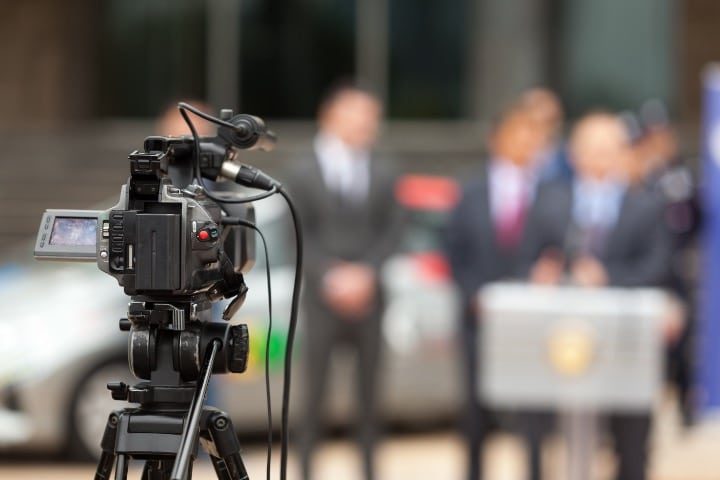
It is an easy step from restraining the press to making it place the worst actions of government in so favorable a light, that we may groan under tyranny and oppression without knowing from whence it comes. — “Cincinnatus” No. 2
The First Amendment is clear:
Congress shall make no law … abridging the freedom of speech, or of the press….
If the Constitution is to be respected as the “supreme law of the land,” then any attempt by a government official to prevent a person’s access to the press is unconstitutional and historically one of the first steps toward absolute tyranny.
Recently, a federal judge recognized that fact and protected the right of anyone to make use of the press and use it to criticize the powerful and call the corrupt to account.
Here’s a small backstory as published by Reason online:
“Justin Pulliam, a citizen journalist arrested while covering Fort Bend County Sheriff’s deputies, won a first-round victory in his civil rights lawsuit brought by the Institute for Justice (IJ),” the organization announced this week. “A federal district court rejected the sheriff’s attempt to dismiss the case. Pulliam will have the opportunity to hold the sheriff and his deputies responsible for violating his First Amendment rights to record the police and to be treated the same as established media or other members of the public.”
Admittedly, Pulliam has not won this war, but the judge’s order did sway the first battle his way.
Beyond the judicial victory, however, the judge’s order is a victory for the freedom of the press generally, and the right of the people to enjoy the protection the First Amendment affords to the press.
The sheriff’s office argues that Pulliam isn’t a member of the “media,” and therefore his videos don’t qualify as “the press,” and therefore they are not protected by the First Amendment.
Of course they would say that. Pulliam’s YouTube channel — Corruption Report — is devoted to exposing the corruption of police interaction with citizens. As their way of demonstrating their opinion that Pulliam isn’t a “member of the press,” the sheriff’s department kicked him out of a press conference and arrested him for recording officers’ treatment of a person suffering a mental crisis.
This is a common occurrence today. The fact that one must show one’s “press credentials” to be allowed into certain public meetings is anathema to the very conception of a free press as held by those who wrote and supported the First Amendment.
Proving this is as easy as reading James Madison’s original wording of that part of the First Amendment at issue in this case, that is, concerning freedom of the press and speech. On June 8, 1789, then-Congressman James Madison proposed the following protections to be included in the Bill of Rights:
The people shall not be deprived or abridged of their right to speak, to write, or to publish their sentiments; and the freedom of the press, as one of the great bulwarks of liberty, shall be inviolable.
Notice who Madison says gets the protection of the free press? The people. All the people enjoy this right, not just some select segment of them that have earned the right by playing nice with the regime.
The first sentence of the order entered by Judge David Hittner of the U.S. District Court for the Southern District of Texas made it clear that he understands and applies Madison’s scope of the protection afforded to the press.
“This is a civil rights case. Plaintiff Justin Pulliam (‘Pulliam’) is an independent journalist who films activities of public interest, including police interactions with civilians,” Judge Hittner wrote.
Hittner later offered a summary of the evidence pointing to the pertinent question of whether or not Justin Pulliam’s work is protected by the First Amendment’s protection of the freedom of the press:
Based on the facts alleged in the complaint, it appears Pulliam was singled out and arrested for exercising his rights under the First Amendment.
To prevent such persecution was precisely the purpose of ratifying the First Amendment’s protection of speech and the press.
The irony today, of course, is that more often than not, the press simply functions as a mouthpiece for the government. This unholy alliance has created this bifurcation between “the press” and everyone else.
Government’s view of anyone not playing by the rules they’ve established for being “the press” was most clearly demonstrated in 2013, when Senator Dianne Feinstein (D-Calif.) proposed an amendment that would have established a narrow definition of “journalist” and would have explicitly denied First Amendment protection to those who didn’t meet the requirements she set out in the measure.
Feinstein’s definition seems to be similar to that used by the sheriff’s office in its treatment of Pulliam. In her amendment, Feinstein defined a “covered [by the First Amendment] journalist” as being someone who collects and/or reports news on behalf of “an entity or service that disseminates news and information,” so long as they were carrying out “legitimate news-gathering activities.”
Legitimate being the operative word. Legitimate, in this case, meaning, approved by the Establishment.
The fact is that the drafters and ratifiers of the First Amendment had no concept of a “legitimate journalist” or “the media.” To them, the press was simply a way one disseminated one’s opinions. Period. If it was through a newspaper or a pamphlet or a bill posted on walls, the right to make use of such methods of communication was considered sacrosanct and a fundamental right of all men in a free society. Again, to understand that, all you have to do is go back and read the original language of the First Amendment when it was proposed by James Madison.
There is nowhere, in my opinion, that the value of a free press is expressed more clearly or more convincingly than in these words written by David Hume in his essay “Of the Liberty of the Press,” published in 1741 and again in 1777:
It is seldom that liberty of any kind is lost all at once. Slavery has so frightful an aspect to men accustomed to freedom that it must steal in upon them by degrees and must disguise itself in a thousand shapes in order to be received. But if the liberty of the press ever be lost, it must be lost at once. Nothing can impose a further restraint but either the clapping an imprimatur upon the press or the giving very large discretionary powers to the court to punish whatever displeases them. But these concessions would be such a barefaced violation of liberty that they will probably be the last efforts of a despotic government.
As indicated above, the trial isn’t over, so a celebration would be premature. There is, however, hope that a court will recognize that it is the universal right of all men to publish and distribute their opinions, and that those opinions are especially important when they expose alleged corruption on the part of those who are paid out of the taxes taken from the people.



